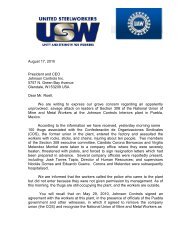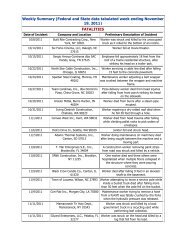National College Players Association - United Steelworkers
National College Players Association - United Steelworkers
National College Players Association - United Steelworkers
You also want an ePaper? Increase the reach of your titles
YUMPU automatically turns print PDFs into web optimized ePapers that Google loves.
If your employer unilaterally implementsa safety program and disciplinesworkers for not followingit, that violates the <strong>National</strong> LaborRelations Act (NLRA), an administrativelaw judge has ruled.The USW won an unfair laborpractice case against Kennametal Inc.,a U.S.-based international tool maker,after the company failed to bargain overa new behavior-based safety programand a new disciplinary policy that focuseson employee behavior as a causeof accidents.Rather than finding and fixing theroot causes of safety hazards, behaviorbasedsafety programs typically shiftresponsibility for maintaining safeworkplaces to individual workers. Such“blame the worker” programs are increasinglyprevalent in industries wherethe USW represents workers, includingthe paper sector where some employersare currently moving in that direction.Kennametal announced on Feb.2, 2010, that it was implementing acorporate-wide Management BasedSafety (MBS) program. The next day,Local 5518 at the company’s Lydonville,Vt., plant asked to bargain overthe program and the company refused,claiming it was not a mandatory subjectof bargaining.In response, Local 5518 filed unfairlabor practice charges with the <strong>National</strong>Labor Relations Board (NLRB). NLRBAdministrative Law Judge Arthur J.Amchan heard the case and issued hisdecision earlier this year.The primary issue in the case waswhether Kennametal violated the NLRAby refusing to bargain over implementationof the MBS program, which cutthe union out of its traditional role inaccident investigations.42 USW@Work • Fall 2011Another key issue was the relationshipof the safety program to the newdiscipline policy. The company arguedthat the two were unrelated while theunion argued that the new disciplinepolicy, which was used to suspend andterminate one worker and reprimand andsuspend another, was sufficiently relatedto the MBS program to require bargaining.Amchan agreed.Union participationPrior to the implementation of thenew program, the union safety committeewas actively involved in investigatingaccidents and working jointly withmanagement in addressing issues.Changing the investigatory method,as Kennametal did, alters the characterof evidence on which an employee’s jobsecurity might hinge, the judge found. Itis less likely, for example, that productionquotas would be considered as anaccident cause without the union’s input.Therefore, the company’s unilateraldecision to stop the union’s participationin accident investigations was a bargainablechange in the terms and conditionsof employment and violated the NLRA,the judge found.Not only did Kennametal giveinadequate notice to the union of itsnew discipline policy, but it changed itslongtime practice of issuing progressivediscipline. This unilateral change to pastpractice also violated the NLRA, thejudge ruled.Suspending one worker and terminatinganother under a stricter disciplinarypolicy that was not negotiated withthe union was also an NLRA violation,the judge found.Company ordered to stopAmchan ordered the company tostop unilaterally changing terms andconditions of employment includingimplementation of the new disciplinepolicy for safety violations.The judge also ruled the companycould not implement its safety programin a manner that excludes union participationin accident investigations or leadsto the discipline of employees for failingto comply with its unilaterally imposedrequirements.Kennametal was ordered to includethe union in accident investigations, toreinstate the fired worker and to makehim and the worker who was suspendedwhole for any lost wages or benefits.There is a lesson to be learned fromthe Kennametal case, suggests LeeannAnderson, special assistant to the InternationalPresident. Local unions shouldrequest bargaining over behavior-basedsafety programs if the employer tries toimplement them without first engagingin bargaining.






